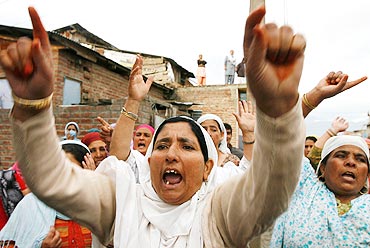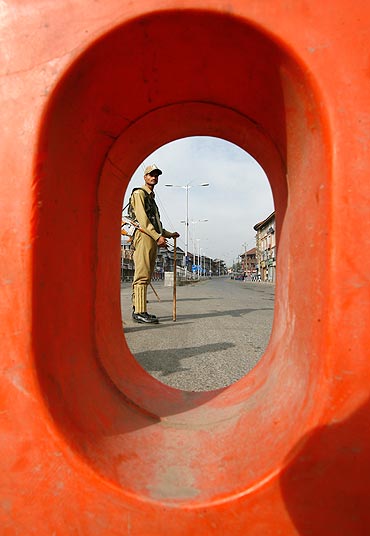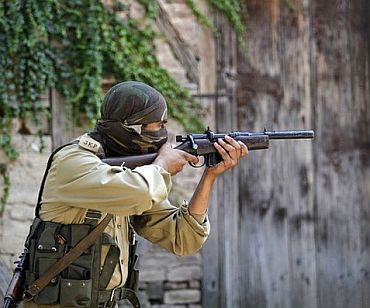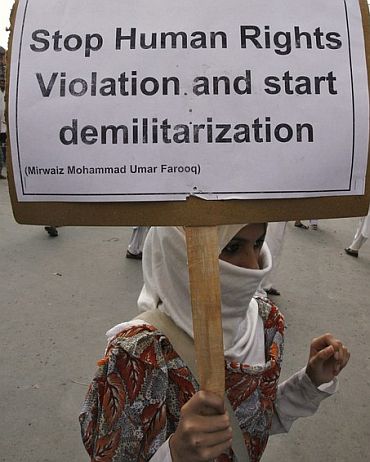 | « Back to article | Print this article |
Human rights abuses in Kashmir
In a rare briefing with the then United States ambassador to India, the International Committee of the Red Cross in 2005 expressed concern over alleged human rights violations in Kashmir and spoke about torture in detention centres, though it pointed out that the situation was much better than in the 1990s.
Red Cross stressed that it was not asking for US government action, but may seek to mobilise support in the future, "if its relations with the government of India do not improve," says the secret cable from the US embassy in New Delhi.
Made public by WikiLeaks, the cable signed off by the then US ambassador to India David Mulford, is dated April 6, 2010 and has been classified by the then deputy chief of mission Robert Blake, who now is the assistant secretary of sate for south and central Asia. The United States has accused WikiLeaks of stealing its secret cables. However, it has refused to either deny or confirm the authenticity of these cables.
Kashmir situation is 'much better' now
The name of the ICRC briefer has been deleted from the cable by WikiLeaks. "XXXXXXXXXXXX reported that during recent ICRC interactions with the GOI, officials have maintained that the human rights situation in Kashmir is 'much better than it was in the 1990s,' a view he also agreed with," the cable said.
"Security forces no longer roused entire villages in the middle of the night and detained inhabitants indiscriminately, as they had as recently as the late 1990s," it said. There is "more openness from medical doctors and the police," who have conceded that 95 per cent of the information on particular cases is accurate, he said.
He said while 10 years ago, there were some 300 detention centres, now there are 'a lot fewer'.
Red Cross denied access to detention centres
While acknowledging these improvements, the briefer suggested there were persistent problems like widespread use of 'IT' (ill-treatment) and 'torture' during interrogation that takes place in the presence of officers, and said the ICRC has raised these issues with the government of India for more than 10 years.
It said ICRC has never obtained access to the 'Cargo Building,' 'the most notorious detention centre in Srinagar'. The briefer said that current practices continue because 'security forces need promotions', while for militants 'the insurgency has become a business'.
According to the cable, the ICRC official indicated that his organisation would seek another Roundtable meeting with the ministry of external affairs and ministry of home affairs between April and June.
'Stable trend lines of ill-treatment and torture'
"The ICRC New Delhi office also wants its President to visit India, to raise these and other issues in a meeting with Prime Minister Manmohan Singh," the cable said.
"XXXXXXXXXXXX considered this 'very important,' although stressed that it was not agreed," the cable said.
"In his comments, Mulford notes that the fact that ICRC reversed its practice of the last several years to provide this briefing to us reflects its frustration with the MEA and MHA, although we note that their experience with security forces in J&K is clearly better than in the past, pragmatic and bordering on the positive," the cable says.
It said the data showing "stable trend lines of ill-treatment and torture in detention centres are very disturbing, because the practice continues unabated".
'All branches of the security forces used torture'
ICRC considers the status quo 'unacceptable and wants substantive dialogue with the GOI,' Mulford wrote.
"Their approach to us may be a prelude to a more assertive stance vis-a-vis New Delhi, which could be helpful in goading the home ministry and defence ministry in taking firmer action, but also risks backfiring if the GOI starts to back out of a long-negotiated working relationship which has produced valuable results over the past decade," he said.
According to the cable, Mulford said ICRC staff made 177 visits to detention centers in J&K and elsewhere (primarily the North East), between 2002-2004, meeting with 1,491 detainees, 1,296 of which were private interviews.
In 852 cases, detainees reported what ICRC refers to as 'IT' (ill-treatment). "ICRC stressed that all the branches of the security forces used these forms of IT and torture," it said.




